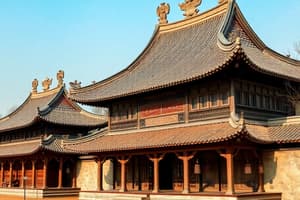Podcast
Questions and Answers
What is the primary focus of the thematic approach in historical analysis?
What is the primary focus of the thematic approach in historical analysis?
- Examining random events over time
- Analyzing specific themes across periods (correct)
- Emphasizing anecdotal evidence
- Studying individual contributions of historians
Which historian is known for emphasizing evidence and rational analysis in his work on the Peloponnesian War?
Which historian is known for emphasizing evidence and rational analysis in his work on the Peloponnesian War?
- Fernand Braudel
- Herodotus
- Thucydides (correct)
- Eric Hobsbawm
What is the key characteristic of Fernand Braudel's contributions to history?
What is the key characteristic of Fernand Braudel's contributions to history?
- Advocating for short-term political history
- Focusing on brief historical events
- Emphasizing long-term social structures (correct)
- Centralizing individual heroism in narratives
Which interdisciplinary approach enriches the understanding of historical contexts?
Which interdisciplinary approach enriches the understanding of historical contexts?
Eric Hobsbawm is notably recognized for his works on which of the following?
Eric Hobsbawm is notably recognized for his works on which of the following?
Which characteristic is unique to the Ancient Civilizations period?
Which characteristic is unique to the Ancient Civilizations period?
What major cultural shift characterized the Renaissance period?
What major cultural shift characterized the Renaissance period?
Which event is NOT associated with the Middle Ages?
Which event is NOT associated with the Middle Ages?
What does 'globalization' primarily refer to in historical context?
What does 'globalization' primarily refer to in historical context?
In which historical period did the Age of Exploration occur?
In which historical period did the Age of Exploration occur?
Which of the following best describes the 'Continuity and Change' concept in history?
Which of the following best describes the 'Continuity and Change' concept in history?
What significant event is attributed to the 20th Century?
What significant event is attributed to the 20th Century?
Which approach is useful for understanding sequences and causality in history?
Which approach is useful for understanding sequences and causality in history?
Flashcards are hidden until you start studying
Study Notes
Key Periods in History
-
Prehistoric Era
- Characterized by the absence of written records.
- Divided into the Stone Age, Bronze Age, and Iron Age.
- Development of early human cultures and tools.
-
Ancient Civilizations
- Emergence of writing, organized governments, and urban centers.
- Notable civilizations: Mesopotamia, Egypt, Indus Valley, China, and Mesoamerica.
- Major achievements in art, architecture, and mathematics.
-
Classical Antiquity
- Time of great empires: Roman, Greek, Persian, and Maurya.
- Development of philosophy, art, and science.
- Spread of religions such as Christianity, Buddhism, and Hinduism.
-
Middle Ages (Medieval Period)
- Fall of the Western Roman Empire leads to fragmentation in Europe.
- Rise of feudalism and the Catholic Church's influence.
- Major events: the Crusades, the Black Death, and the Hundred Years' War.
-
Renaissance
- Cultural revival in Europe, emphasizing humanism, art, and science.
- Key figures: Leonardo da Vinci, Michelangelo, and Galileo.
- Advances in literature, exploration, and the questioning of authority.
-
Early Modern Period
- Age of Exploration expands global trade and empires.
- Scientific Revolution leads to new ways of understanding the universe.
- Political changes: rise of nation-states and the Enlightenment.
-
19th Century
- Industrial Revolution transforms economies and societies.
- Rise of nationalism and imperialism.
- Major movements: abolition, suffrage, and labor rights.
-
20th Century
- World Wars I and II reshape global politics and borders.
- Cold War between the USA and USSR influences international relations.
- Major social changes: civil rights movements, decolonization, and technological advances.
Important Concepts
-
Causation
- Understanding how and why historical events occur.
- Analysis of long-term vs. short-term causes.
-
Historical Interpretation
- Different perspectives on historical events based on context and bias.
- Importance of primary and secondary sources.
-
Continuity and Change
- Examination of what has remained the same and what has evolved over time.
- Identifying patterns and trends in history.
-
Globalization
- Increasing interconnectedness of nations and cultures.
- Impact of trade, migration, and communication technologies.
Methodologies in Historical Study
-
Chronological Approach
- Organizing events in the order they occurred.
- Useful for understanding sequences and causality.
-
Thematic Approach
- Focus on specific themes such as politics, economics, or culture across different periods.
- Allows for comparative analysis.
-
Interdisciplinary Approaches
- Incorporating insights from archaeology, anthropology, sociology, and economics.
- Enriches understanding of historical contexts.
Notable Historians
-
Herodotus
- Often called the "Father of History" for his work on the Greco-Persian Wars.
-
Thucydides
- Known for his account of the Peloponnesian War, emphasizing evidence and rational analysis.
-
Fernand Braudel
- Key proponent of the Annales School, focusing on long-term social history and structures over events.
-
Eric Hobsbawm
- Notable for his works on the 19th and 20th centuries, particularly in relation to nationalism and capitalism.
Key Periods in History
-
Prehistoric Era
- No written records; includes Stone Age, Bronze Age, and Iron Age.
- Marks the development of early human cultures and tools.
-
Ancient Civilizations
- Writing systems, organized governments, and urban centers emerge.
- Key civilizations include Mesopotamia, Egypt, Indus Valley, China, and Mesoamerica.
- Significant contributions in art, architecture, and mathematics.
-
Classical Antiquity
- Era of large empires: Roman, Greek, Persian, and Maurya.
- Flourishing of philosophy, art, and scientific discovery.
- Spread of major religions: Christianity, Buddhism, and Hinduism.
-
Middle Ages (Medieval Period)
- Fragmentation of Europe following the fall of the Western Roman Empire.
- Feudalism rises; the Catholic Church becomes influential.
- Important events include the Crusades, the Black Death, and the Hundred Years' War.
-
Renaissance
- Cultural resurgence in Europe focusing on humanism and scientific inquiry.
- Prominent figures: Leonardo da Vinci, Michelangelo, and Galileo.
- Innovations in literature, exploration, and challenging established authority.
-
Early Modern Period
- The Age of Exploration broadens global trade and colonial empires.
- The Scientific Revolution introduces new scientific methodologies.
- The rise of nation-states and Enlightenment thought characterize political changes.
-
19th Century
- Industrial Revolution alters economic and societal structures significantly.
- Emergence of nationalism and imperialism.
- Key movements include the abolition of slavery, women's suffrage, and labor rights advocacy.
-
20th Century
- Global politics reshaped by World Wars I and II.
- The Cold War era defines USA-USSR relations and geopolitical landscape.
- Major social transformations driven by civil rights movements and decolonization efforts.
Important Concepts
-
Causation
- Investigates the reasons behind historical events; distinguishes between long-term and short-term causes.
-
Historical Interpretation
- Evaluates different viewpoints on historical occurrences; emphasizes the significance of primary and secondary sources.
-
Continuity and Change
- Studies what aspects of history have remained constant and what has changed; identifies historical patterns and trends.
-
Globalization
- Highlights the growing interconnectedness of global nations and cultures through trade, migration, and technology.
Methodologies in Historical Study
-
Chronological Approach
- Events are organized sequentially; aids in understanding cause and effect relationships.
-
Thematic Approach
- Focuses on specific themes (e.g., politics, culture) across different historical periods; enables comparative studies.
-
Interdisciplinary Approaches
- Integrates insights from various fields such as archaeology, anthropology, sociology, and economics; deepens context comprehension.
Notable Historians
-
Herodotus
- Recognized as the "Father of History" for documenting the Greco-Persian Wars.
-
Thucydides
- Famous for his analytical account of the Peloponnesian War; emphasized evidence-based analysis.
-
Fernand Braudel
- Prominent figure of the Annales School; focused on long-term social structures beyond mere events.
-
Eric Hobsbawm
- Renowned historian of the 19th and 20th centuries, especially related to concepts of nationalism and capitalism.
Studying That Suits You
Use AI to generate personalized quizzes and flashcards to suit your learning preferences.




